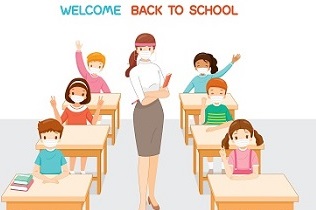Returning Safely to In-Person Learning
Returning Safely to In-Person Learning

After nearly two years of chaos and uncertainty in the face of COVID-19, the world has begun to open up again. Vaccination rates in the United States have been slow and steady, ensuring many individuals' safe return to their pre-pandemic lifestyles. People are returning to work, albeit reluctantly, visiting friends and family, and children have been cleared to resume in-person learning. But there's a problem. Many parents are reluctant to allow their children to return to in-person school. They have become accustomed to eLearning or virtual education practices and do not want their children to return to a potentially hazardous environment, even when research conducted by the CDC has shown that children under the age of fifteen are less likely to die or face adverse effects of COVID-19 than those seventy-five years or older. And because the largest dangers of COVID-19 are soon to be designated as lower priority, new priorities must take their place. In this case, it is imperative that we get children back on track with their education as well as improving their social skills.
In the beginning of the pandemic, it was necessary to shut down the world in order to prevent the further spread of the virus. It is a massive understatement to say that no one was happy in quarantine, especially if you had young children at home. Though schools moved online, it became difficult for students to access their classes, especially if they came from disadvantaged homes. Zoom classes, as they were dubbed by the public, required a computer or smartphone and a reliable internet connection in order to attend school. If a student did not have even one of these required tools, they were forced to miss classes through no fault of their own. In a literature review conducted by Zethembe Mseleku (2020), multiple studies found that network connectivity and lack of a productive learning environment were some of the biggest barriers in online learning, resulting in substantial learning loss equivalent to one-fifth of a school term. (Engzell, Frey, & Verhagen, 2021)
One of the biggest adversities children have faced in quarantine is social isolation from their peers. Schooling and extracurricular activities associated with long-term education plans were the first to go during the shutdown, as the highest priority was to protect children from the spread of the virus. While necessary for the safety of the public, this has shown to have devastating effects on pediatric mental health. One study found social isolation to be the most challenging part of online education, especially for older children, who were in the process of developing independence and autonomy from their parents. For younger children, the absence of friends and worry for their family’s well being was the main cause of stress. A literature review has also found a strong correlation between the length of isolation and the deterioration of mental wellness in children rather than the feelings associated with loneliness, suggesting that children who have been in quarantine the longest are more likely to have symptoms of depression and anxiety.
For children with disabilities, online education can be especially challenging. One study focusing on the experiences of teachers in special education found additional hardships in providing online services for disabled students. (Braun, Walte, Emerling, & Bruce, 2020) The lack of in-person support by teachers and paraprofessionals is a big contributing factor, especially since many disabled students require high levels of care that their parents or guardians may not be prepared for or cannot afford. The resources, which may be more readily available in a public or private school setting, have been taken away from those who need it the most during a crisis. Returning these students to school could mean the difference between continuing their education or dropping out because they don't have the support.
The public has shown a great deal of anxiety and stress associated with returning to life as we know pre-COVID. Particularly important for children with social anxiety and OCD, we recommend implementing Exposure and Response Prevention (ExRP) methods on a regular basis. ExRP is an evidence-based treatment method that focuses on teaching patients how to tolerate feelings of anxiety without performing safety behaviors such as hand-washing, counting, or reassurance seeking. Therapists who specialize in the treatment of obsessive-compulsive and related disorders are trained to administer this method, which has shown to be effective for all ages. ExRP is beneficial for both the child and the parent because it can help ease everyone back into their regular routines while practicing tolerating discomfort. That being said, the CDC still recommends that children and/or teachers be masked unless they have received a full course of vaccinations. We must find the middle ground between overcaution and practicing research-recommended, healthy precaution.
The future is always going to be uncertain. There will always be events that we cannot anticipate, on an individual or global level. The best that we can do is follow the standard safety precautions recommended by scientific research and take each day one at a time. The long-term effects of the pandemic on our youth has yet to be seen, but we must do everything in our power to help them recover from the loss of social interaction with their peers. Even if it means taking on uncertainty.
For more information about ExRP and clinicians that specialize in working with children, visit the help and treatment section of the ADAA website. Special thanks to Rebecca Braverman for her assistance in writing and researching this post.
















